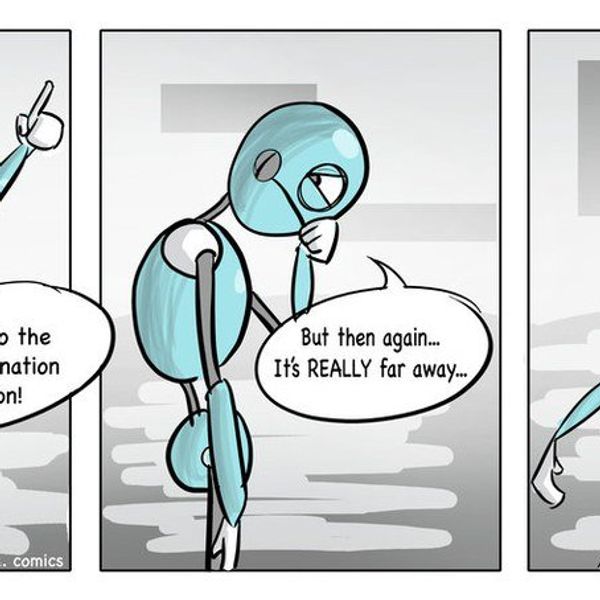You've been working hard all semester, no doubt, between projects, tests, labs, and whatever extracurriculars and other obligations you have going on. Maybe you're still as starry-eyed, impassioned, and ready-to-roll as you were at the beginning of the semester (in which case, all the more power to you!), but chances are that you're starting to feel a little run down and a little less motivated to put down school-related keystrokes.
You're not lazy or a bad person for this--burnout happens to the best of us, however studious and hard-working we may be. Those essays still have to be written, however, motivation or not. Take a break (as you're probably doing right now), take a breath, take whatever below works for you (most of this you've heard before, but maybe you need the reminder), and then get on to it!
1. Break it down into small, manageable steps.
 StableDiffusion
StableDiffusionYou really don't feel like writing that 2000 word term paper with ten outside sources and proper citations right now...but do you feel like, say, finding five of those ten sources right now? Do you feel like writing your introductory paragraph right now? Your outline? Your thesis statement?
Going from a blank document to a journal-worthy publication can feel like going from Netflix and nap to the Boston Marathon, but going from Netflix and nap to 15 minutes on the treadmill twice a week, then from 15 minutes on the treadmill twice a week to 30 minutes on the treadmill three times a week, then from that to an hour on the treadmill 4 times a week, and so forth until you hit that marathon burns a little less.
Likewise, your finished, final essay is a marathon that's 6 months away (okay, maybe a week or two), but today, right now, your goal is to walk for 15 minutes. What small task do you have the time and energy to do right now? Just one paragraph? Just one outline? Just one source?
Whatever you can do right now, even if it doesn't seem like a lot right now, is one less thing that you'll have to do the next time you sit down to work on this. If you work on your essay for just 15 minutes a day, you'll have put in a whole hour's worth of work in four days (which, okay, doesn't sound as accomplished put that way, but that's an hour more of work than not having done anything for a week out of dread and the lack of wherewithal).
The even better news is that working often begets working. Maybe you only set out to do a brief Roman-numeral outline, and maybe that's all you really needed to have done for this moment. But maybe you're making that outline and you realize that you don't really know what you want to say in paragraphs 1, 3, or 5, but you know exactly what's going on in paragraph 2, so you put so much detail into that part of the outline that you start writing in sentences with transitions and all of that, and, before you realize it, you have a fifth of your paper typed out.
2. If you need help breaking it down, try Pomodoro (or any similar technique).
 Photo by Andrea Riezzo on Unsplash
Photo by Andrea Riezzo on UnsplashNamed after the Italian word for "tomato" (the shape of the timer that the original practitioner used), the Pomodoro technique is a way to structure your work time and break times.
Work for 25 minutes with no distractions; finish as much as you can. Mark an "X" on a log for working for 25 minutes. Take a break for 5 minutes; do something fun, do something relaxing, but don't do any work.
Work for another 25 minutes. 5 minute break.
Work 25. Break 5.
Work 25. Break 20 (after having done four "pomodoros," or 25-minute productivity sessions, you deserve it).
Repeat for as long or as little as time and willpower permit. Of course, feel free to modify work times and break times to match you--if you need to break every 10 minutes, go for it, and if you work better powering through in hour-long increments, go for it. Just remember that breaks reset the mind, and the promise of a break resets your will to keep dragging through that work time.
And, yes, there's an app for that, for both Android and Apple (and probably any other interface with an app store, too). In fact, go to the "Productivity" section of any app store and you'll find timers, planners, lists, mind-maps, brainstorming tools, and calendars galore. Some of these may work well for you; some that get 5 stars from 3 thousand reviewers may not do you, personally, an ounce of good.
Find what works for you, whether that be an app or any other time management method.
3. Remember your end goal.
 StableDiffusion
StableDiffusionThe end goal of writing that paper is to write about everything that the professor and/or rubric mandates while meeting any word or page limit and following the style guide for your course, yes, but there's a larger reason why you're doing this. This essay is a step towards completing a class, a class that hopefully is helping you develop the skills, knowledge, and connections you need in order to perform in that dream career or hobby that you'll pursue once you pass enough of these classes and obtain that coveted sheet of paper known as the degree.
So while you might not be able to muster the give-a-dang about an essay analyzing [Insert Socio-Historical Context Here] in [Insert Literary Work Here], you might find it a little easier to care about, say, paying off your parents' debt or saving lives with a scalpel or changing the world with your ability to reach others through words, television, music, art, education, what-have-you. Remember why you were so excited to get accepted into your school and your program; remember what you wanted to be when you were in kindergarten and how much of that kindergartener was still in you when your high school guidance counselor asked you the same question. Remember why it's worth it, and remember that this essay in front of you, while by no means as important as whatever comes next, is crucial to you getting to that place you want to get to.
4. But don't worry yourself numb.
 Photo by Kelly Sikkema on Unsplash
Photo by Kelly Sikkema on UnsplashMaybe what's burning you out isn't that you find it hard to care; maybe you care so much that you want everything to be the absolute best, and you know that you're tired and that you don't do your best work when you're tired, so maybe you're waiting for more energy, more motivation, more inspiration to come around so that you can put your absolute best into that essay and into whatever that larger dream entails.
The problem is that you don't have the time to wait. By all means, if you're so tired that you can't keep your eyes open, go get some rest, and if you're so overworked that the room is spinning and your head is throbbing, please take a break, but you eventually have to get started, even if you don't feel as confident or as eloquent as that final essay needs to be.
It's a lot easier to carve a good essay out of a not-so-well-written rough draft than it is to carve a good essay out of a blank document. You can edit later, but you can't edit something that doesn't exist. A rough draft doesn't have to be perfect--it just needs to be there.
The final draft doesn't have to be perfect, either, though it's admirable to want it to be as a good as possible. Remember that while this essay is a part of passing your class, it is (probably) not the whole class; unless you do something silly like plagiarize or steal (don't do that!), this one essay isn't going to make or break your future. You want to do as well as you possibly can, sure, but remember that a shaky essay you've been shakily writing for a week typically does better grade-wise and content-wise than a frantic essay that you threw out the night before because you waited for the "right moment" that never came, and even that last-minute essay is better than no essay at all and, given steep Late Work policies, is probably better than turning in your essay late. One essay does not a scholar make...and chances are that it won't come out as poorly as you fear it might, anyways. Breathe in, breathe out, and just try your best. That's all you can really given.
5. Look after your mental health.
 Photo by rosario janza on Unsplash
Photo by rosario janza on UnsplashEverything above is easier said than done, but if you absolutely, positively cannot bring yourself to work on the essay out of paralyzing fear of failure or having zero ability to muster any give-a-dang whatsoever, then it may be time to check in with a counselor and see if there may be some underlying anxiety or mood disorder or another mental health condition that's influencing your ability to be productive. Some degree of worry, some degree of lethargy, and some degree of slipping up from time to time is to be expected, of course, but if your grades are suffering or if it has become a lot harder for you to function, then this is something that needs to be looked into, and your school's counseling department or another trusted mental health professor is a great place to look into it. Mental health conditions tend to peak around college age--around 1 in 5 college students (if not more!) are currently dealing with a mental illness. It's not a sign of weakness; what it is, though, is treatable, or at least manageable, and this management can make the day-to-day things like essay writing a lot easier to deal with.
So, after you evaluate your need for mental health services and act accordingly, reflect on what your end goal is, and get to work. Maybe "work" is just a few small tasks for a few minutes each day, but little progress is better than no progress at all. Writing essays aren't always fun or easy, but you're writing them for a reason, and it's easier to get to writing if you actually, well, get to writing.
Seriously, though, you got this.





















